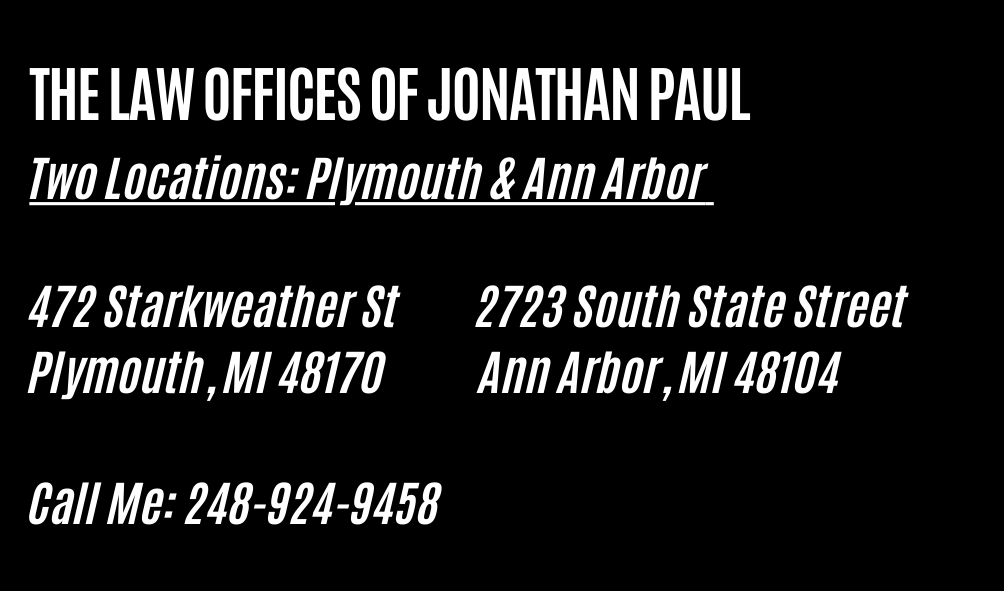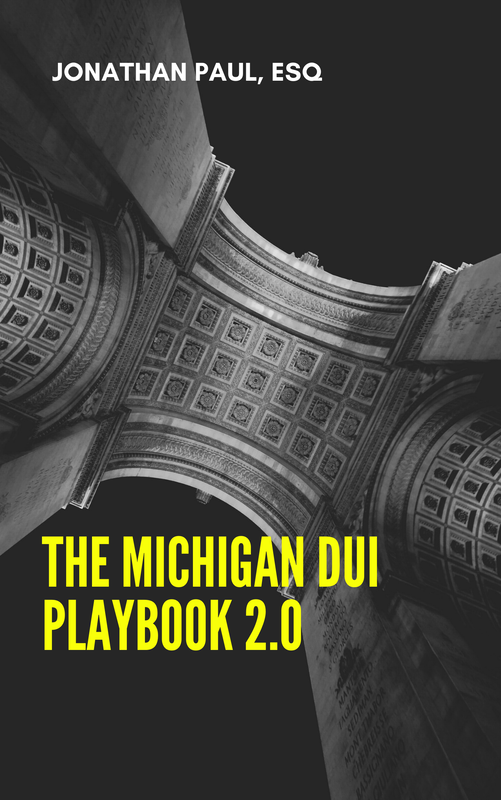|
If charged with a felony DUI in Michigan, your case will begin at the district court level with a preliminary examination. This would be a third offense or more, or a case, which caused serious bodily injury or death.
If charged with a felony, you are entitled to this hearing within 21 days of your arraignment, but can waive this timeframe if you wish to invest more time in conducting discovery, or working a proactive plan in order to open up some options for resolution. A preliminary examination is put in place to “test” the evidence before the case can go to the circuit court level. The “test” is probable cause; is it probable based on the evidence that a crime was committed, which is named in the information, and is this the person that probably committed it. This is not a test of guilt or innocence, but a safeguard put in place to make sure that someone is not charged based on very thin or problematic evidence. If there is enough evidence your case is “bound over” to the circuit court. This can be done by holding the examination and having the judge weigh the evidence, or both sides can agree to a waiver. Many innocent people are “bound” over, because in DUI cases, there is usually enough evidence that it is probable the person arrested broke the law in some way with alcohol or a controlled substance. For example, there may be evidence that the Defendant tested over the legal limited or had marijuana in their system when driving. That would make it probable that a crime was committed, but not quite guilty. This book is filled with defenses to cases where the Defendant “looks guilty”. So how do you beat the case at preliminary exam? You can beat the case in two ways. An outright dismissal of charges, or a reduction down to a misdemeanor. First, outright dismissal is rare for a DUI case, because there will usually be some triable facts, which are better resolved at trial, but what if there is concrete evidence that the Defendant was not the driver? What if it turns out that the roadway, which the Defendant operated was not open or accessible to the public? What if the traffic stop was bogus and the officer lacked a legal reason for conducting a traffic stop? These, and many other situations could lead to a dismissal. Second, a limited number of counties in Michigan will consider dismissing a felony DUI case, and reducing in down to a misdemeanor. This is a possibility if the current charge is a “true third” meaning you’ve only had two prior offenses. It helps if the priors are deeper in the past, and not recent, and if the BAC number is somewhat on the lower end of the spectrum, and there was no accident. I’ve been able to have a lot of felony DUI cases dropped to misdemeanors, but those particular cases had clients who worked their butt off on my proactive program, and were willing to make major commitments to sobriety including daily testing, intensive treatment, and sometimes sobriety court or jail alternative programs like Impact Weekend. If the case is reduced down to a misdemeanor then it will be handled at the district court level, because a felony is now off the time table along with prison time. A judge will still consider your past offenses, but has less in his/her bag of sentencing tricks, because the offense is now a misdemeanor. The prosecutor decides the charge, the judge decides the sentence. I’ve already covered how my proactive program helps inside the courtroom with the prosecutor, judge, probation and outside the courtroom in my client’s life, but I also wanted touch on a few additional thoughts on felony DUI cases.
When you’re charged with a felony in Michigan, prison is now on the table. In Michigan, a jail sentence is a firm number, and usually ends up being less time served. When sentenced to prison, you only get a minimum number, but the maximum always remains in place; you must also be paroled out; there is no automatic return home date. Going to prison for a DUI case in Michigan can mean a very long time away from your friends and family. Although a third DUI in Michigan could mean up to 5 years in prison, and a DUI causing death could be 15 years in prison, jail is still the most likely outcome for felony cases. In fact for a DUI third offense, there is a mandatory 30 day jail sentence that must be imposed by the judge. While work-release, house arrest and other alternatives were used in the past by judges, most Michigan judges are now following the 30 day jail minimum without these alternatives. In fact, most judges I come across usually have 60 to 120 days jail in mind when it comes to a third offense DUI. When I work with a client who is charged with a third offense DUI, we may be able to work toward a misdemeanor reduction, which avoids a felony record, 5 years worth of prison on the table, possibility of keeping a driver’s license, and the mandatory jail sentence. This is quite rarely offered, but in some Michigan counties it is a real possibility. This result doesn’t just happen, it must be earned, and my program provides the tools and resources to get it done, and get it done well. The first thing any client who is charged with a felony DUI does on my program is begin testing 2-3 times per day daily for alcohol. There is zero benefit of the doubt from anyone once you’ve had 3 or more DUI arrests. The client will also get into intensive counseling and hit an AA meeting 3-5 times per week. These are minimal considerations. I typically add a few other requirements into the mix. Getting my client started on the program provides the client an opportunity to climb out of the very deep hole they have dug for themselves. It’s likely their own families and friends have turned on them at this point, and the community views them as nothing more than a very dangerous and untrustworthy criminal. I try to provide the client with something new, something they have never had in their life. I offer a rigorous program, providing structure and unlimited opportunity to change the perception of their case. Following my lead could mean avoiding a felony, jail, prison and loss of the ability to drive. Each felony DUI in Michigan presents it’s own challenges, but also opportunities to create a healthier client and a safer community. I will not even consider a client charged with a felony DUI if they are not willing to dig in deep, and follow my lead 100 percent. Felony DUI Discovery Process in Michigan - Preliminary Examination - Challenge the Evidence5/5/2016
While the discovery process remains very similar when it comes to a misdemeanor DUI vs a felony DUI, there are a very important key considerations.
If a felony DUI is charged based on it being a third or more offense, it will be important to track down records of the prior cases along with the sentence imposed. If the prosecutor is using out-of-state convictions as the basis of the Michigan charge, there many be an opportunity to challenge these priors as a basis for the felony. It’s important to understand what the prior sentences were, because it will assist in crafting a potential outcome in the present case. For example, if the client has prior DUI offenses, and in their prior sentences, they never received counseling, either outpatient or inpatient, it may help to make an argument that the client does not need jail, but rather should have the opportunity to receive treatment. If the felony DUI is charged based on causation of a serious bodily injury or death, the discovery will be a lot more expansive, and include accident reconstruction, medical records, autopsy reports etc. Felony cases also differ in that a preliminary examination is available to the defense to challenge the case, but sometimes more realistically to simply conduct further discovery during this process. A well-planned cross-examination of witnesses at the preliminary examination can be fruitful is learning more about the case, but also it may lead to the discovery of additional information, which may not have been apparent before putting a witness on the stand. A preliminary examination can be a test-drive of the prosecution’s case without the risk of being found guilty of the charge. Typically once the examination is complete, a new judge is assigned to the case, and a new prosecutor will take over. A felony DUI carries severe driver’s license ramifications and mandatory jail time, so the preliminary examination is a key component to both challenging and learning more about the strengths and weaknesses of the case. This information is invaluable when it comes to leveraging plea deals from a prosecutor, sentencing agreements from a judge, and preparing for trial. Michigan OWI Causing Death is an elevated and more serious offense for drunk driving in Michigan. The penalty for this offense is a maximum of 15 years in jail, a fine between $2,500 and $10,000, vehicle forfeiture, mandatory vehicle immobilization and possible restitution.
Although the elements of this offense are similar to the regular Operating While Intoxicated with the additional elements that the defendant voluntarily decided to drive knowing that he/she had consumed alcohol or a controlled substance or a combination of alcohol and a controlled substance and might be intoxicated or visibly impaired. The prosecution must also show that that the defendant's operation of the vehicle caused the victim's death. To "cause the victim's death, the defendant's operation of the vehicle must have been a factual cause of the death, that is, but for the defendant's operation of the vehicle the death would not have occurred. In addition, operation of the vehicle must have been a proximate cause of death, that is, death or serious injury must have been a direct and natural result of operating the vehicle. OWI Causing Death statute requires no causal link between defendant's intoxication and victim's death, defendant's operation of the motor vehicle must cause victim's death, not defendant's intoxication, intoxication is not a component of the causation element. Courts have ruled that this charge is valid in a situation where the defendant vehicle no longer be in motion, but rather the victim's death be caused by the defendant's operation of the vehicle while intoxicated, which crashed, and the result of that crash is the car remains in the middle of the highway, which then causes a risk of injury or death to others. This type of case is defended like an ordinary OWI case in that the prosecution must show intoxication. If the prosecution is not able to show intoxication, this higher charged cannot be proven beyond a reasonable doubt. If the prosecution is able to prove intoxication, there are still other options to defend your case. An accident reconstruction specialist can be used to collect evidence about the events that led to the collision. This specialist will examine the vehicles, tire marks, road conditions and interview witnesses; if the specialist determines that you were not responsible for the crash, this may help your case immensely. A separate charge is an OWI Causing Death of Emergency Personnelwhich is any of the Operating While Intoxicated offenses or the Operating with Presence of a Controlled Substance offense combined with the failure to exhibit due care and caution, which causes the death of a police officer, firefighter or other emergency response personnel. This is a 20-year felony with a fine between $2,500-$10,000, along with vehicle forfeiture and mandatory vehicle immobilization. |
Click to Email Me Categories
All
|
Ann Arbor Office LocationPlymouth Office Location |
Representing DUI Clients in MichiganRepresenting clients charged with a DUI in Ann Arbor, Canton, Brighton, Howell, Saline, Adrian, Taylor, Plymouth, Northville, Westland, Ypsilanti, Pittsfield Towsnhip, Warren, Sterling Heights, Farmington, Pontiac, Romulus, Lansing, Novi, South Lyon, Southfield, Birmingham, Bloomfield Hills, Royal Oak, Troy, Rochester, Jackson, East Lansing, Garden City, Livonia, Dearborn, Detroit, St Clair Shores, Hazel Park, Ferndale, Madison Heights, Waterford, Milford, Shelby Township Clarkston, Oak Park, Berkley, Fraser, Sterling Heights, Clinton Township and others throughout Washtenaw, Wayne, Monroe, Jackson, Genesee, Macomb, Ingham, Lenawee, Livingston and Oakland County.
|








